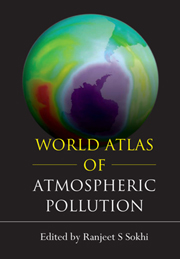Book contents
- Frontmatter
- Contents
- Contributors
- Foreword
- Preface
- Acknowledgements
- International Union of Air Pollution Prevention and Environmental Protection Associations (IUAPPA)
- Global Atmospheric Pollution (GAP) Forum
- Acronyms and Abbreviations
- Selected Units Used in Atmospheric Pollution Science
- INTRODUCTION
- CHAPTER 1 AIR POLLUTION HISTORY
- CHAPTER 2 AIR POLLUTION IN URBAN AREAS
- CHAPTER 3 LONG-RANGE TRANSPORT OF ATMOSPHERIC POLLUTANTS AND TRANSBOUNDARY POLLUTION
- CHAPTER 4 GLOBAL AIR POLLUTION AND CLIMATE CHANGE
- CHAPTER 5 OZONE DEPLETION
- CHAPTER 6 ENVIRONMENTAL AND HEALTH IMPACTS OF AIR POLLUTION
- CHAPTER 7 FUTURE TRENDS IN AIR POLLUTION
- References
- List of Useful Reading Material
- Index
Foreword
Published online by Cambridge University Press: 05 March 2012
- Frontmatter
- Contents
- Contributors
- Foreword
- Preface
- Acknowledgements
- International Union of Air Pollution Prevention and Environmental Protection Associations (IUAPPA)
- Global Atmospheric Pollution (GAP) Forum
- Acronyms and Abbreviations
- Selected Units Used in Atmospheric Pollution Science
- INTRODUCTION
- CHAPTER 1 AIR POLLUTION HISTORY
- CHAPTER 2 AIR POLLUTION IN URBAN AREAS
- CHAPTER 3 LONG-RANGE TRANSPORT OF ATMOSPHERIC POLLUTANTS AND TRANSBOUNDARY POLLUTION
- CHAPTER 4 GLOBAL AIR POLLUTION AND CLIMATE CHANGE
- CHAPTER 5 OZONE DEPLETION
- CHAPTER 6 ENVIRONMENTAL AND HEALTH IMPACTS OF AIR POLLUTION
- CHAPTER 7 FUTURE TRENDS IN AIR POLLUTION
- References
- List of Useful Reading Material
- Index
Summary
We are living in an increasingly shrinking world. Instant communication and the internet have seemingly dissolved time, space and cultural boundaries. The international movement of peoples has reached levels previously unheard of. Globalization has become a catchphrase for our times.
The atmospheric sciences have partly led and partly responded to this process. The extent of continental, hemispheric – and even global – transport of air pollution has become an issue of increasing scientific and policy concern; and nothing emphasises the fragile unity of the planet more graphically than the increasing evidence of climate change – and the portentous implications that emerge as we contemplate the possible consequences of the interaction of air pollution and climate change.
Yet appearances can be deceptive, and are only part of the story. Even for scientists, the ‘Big Picture’ is never easy, and, for the most part, the pressures of professional life mean that we must concentrate on the particular and limit ourselves to our own field. We are able only from time to time to look outside our own boxes, and this task paradoxically becomes more difficult as the totality of knowledge in our separate specialties increases.
For the ordinary citizen, with no specialist training in the atmospheric sciences, there is a similar problem. The unity of the atmosphere, and of the atmospheric sciences, is less easy to grasp than the variety of seemingly separate problems, such as climate change, ozone depletion, urban pollution, and industrial and vehicle emissions, which at different times rightly command separate and urgent attention.
- Type
- Chapter
- Information
- World Atlas of Atmospheric Pollution , pp. xi - xiiPublisher: Anthem PressPrint publication year: 2008



